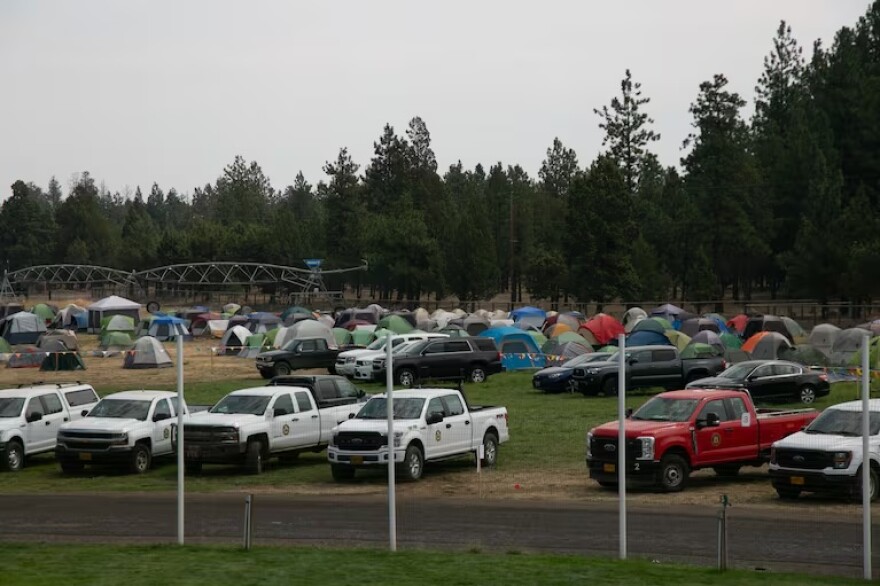In addition, the blaze has destroyed six other structures — meaning shops, barns, garages, sheds, pump houses or similar buildings — and damaged two structures in Deschutes County, the county sheriff’s office said in a Facebook post late Sunday evening.
As of late Saturday, a total of 827 structures in Deschutes County were located within or adjacent to the fire boundaries. The sheriff’s office warned that the number of destroyed or damaged structures may change as more assessments are completed.
The blaze started Thursday evening and had grown to more than 21,971 acres with 0% containment as of Sunday afternoon, when 1,000 homes were under Level 3 “Go Now!” warnings.
The fire marked a dramatic turn in Oregon’s wildfire season amid a heat wave that has gripped parts of the Pacific Northwest.
Jennifer Bear-Loftus, 51, evacuated her home near Sisters late Saturday afternoon and went to a motel in Bend. She said it was a chaotic scene as she left.
“There were a lot of tankers, helicopters and jets flying over,” Bear-Loftus said. “A lot of cars pulled over to the side of the road, a lot of big flakes of ash and some hot ash that was falling.”
As of Sunday afternoon, about 10,000 people were under some level of evacuation notice in an area that stretched from Lake Billy Chinook to the northeast outskirts of Sisters.

On Sunday, first responders were still mapping homes and structures that may have been burned by the fire, but had yet to release estimates of any losses, according to the Deschutes County Sheriff’s Office.
Deschutes and Jefferson counties provide evacuation maps online. A call center is also available to provide information about evacuations: 541-550-4888.
A Red Cross shelter has been set up at Highland Baptist Church at 3100 SW Highland Ave. in Redmond. It operates 24 hours a day for overnight stays, drop-ins and access to food and other resources. Support for large animals is available at the Jefferson County Fairgrounds.
A community meeting about the incident will be held at 6 p.m. Monday at Sisters High School.
The fast-moving fire prompted officials to mobilize structural teams working to protect homes and property, as well as wildland firefighters focused on containing its spread.
More than 800 firefighters had been deployed by Sunday afternoon. They set up their main camp at the Sisters Rodeo Grounds, “with more arriving by the hour,” according to Derek Gasperini, a spokesperson for Oregon Department of Forestry Complex Incident Management Team 3.
“Right now, the Flat Fire is the No. 1 priority in the state,” Gasperini said. “That’s good news that we’re able to bring everything that’s available to bear to suppress this fire and protect homes and structures.”
As he stood in the rodeo grounds office that had transformed into an incident command post over the weekend, about a dozen people worked elbow-to-elbow at folding tables, checking in new firefighters and coordinating teams as they arrived. Outside, temperatures spiked above 90 degrees Fahrenheit.
“It’s still really rough firefighting conditions out there,” Gasperini said. “Air resources are critically important to be able to cool portions of the fire so that we can get lines around it.”

The National Weather Service issued a red flag warning for Central Oregon starting at noon Sunday and going through Monday evening.
“That warning is for high temperatures, low humidities and unstable atmosphere,” Gasperini said.
Those conditions are “more favorable for the fire than the firefighters,” Erin Perkins with the Oregon Department of Forestry said in a Sunday Facebook video.
She said the state initially did not have the resources to control the fire’s perimeter. The emphasis had been on protecting structures.
“Today, we’re looking much better. We have high hopes that we can stop the forward progression of this fire,” Perkins said. “Having said that, we are in a fire fight and the weather’s not that favorable.”
The traffic headed into downtown Sisters on Sunday afternoon was bumper-to-bumper. That’s typical for summer weekends in a town that relies heavily on tourism and serves as a gateway to popular recreation sites.

It was business as usual at the local grocery store Oliver Lemon’s, said employee Corbyn Harris, who was checking out a steady stream of customers.
“We’ve been staying busy, consistent all day. I think people are just grabbing gear and getting prepared and getting water, food, snacks and things like that, just making sure they’re covered for the nights,” he said.
One of his local customers, Monica Tomosy, said she’s always packed for a Level 1 “Get Ready” notice.
“If it’s Level 2, then we’ll put stuff in the car,” she said.
This time does feel more anxiety-inducing for Tomsoy, she said, largely because the fire grew so fast before a cavalry of firefighters could set up camp.
“What happened that they couldn’t get more people here yesterday? That makes me a little more concerned,” she said.
The fire started more than 30 miles away on Thursday. Hiker Susan Beckett was ascending a dicey ridge of the Pacific Crest Trail when she turned around to rest and take in the view.
“Then I saw the smoke,” said the 70-year-old long distance hiking veteran.

Her phone didn’t have service, but she soon ran into a fellow hiker who called 911.
Beckett and other hikers then took refuge at a nearby lake and hoped for the best.
“I had to camp because I was in the middle of nowhere,” she said.
By Sunday, Beckett had hitched a ride north to Sisters so she could buy food and supplies for the next 130 miles of her hike. She said a local “trail angel” who picked her up had just been evacuated.
“She feared that her house had already been burnt,” Beckett said.
Winston Szeto contributed to the story.


